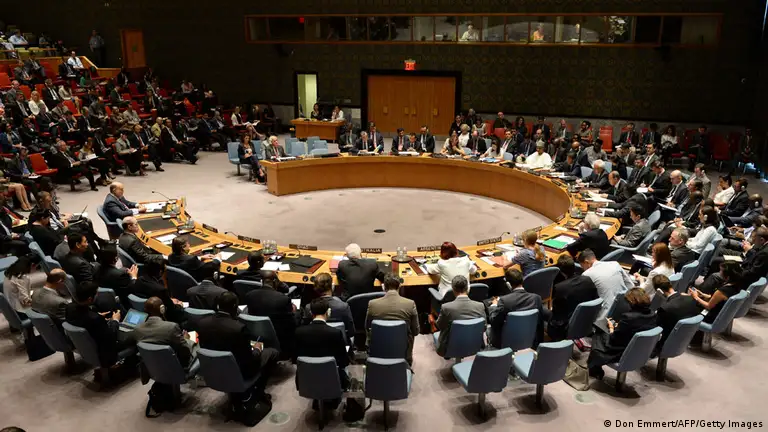Both the UN Security Council and the UN General Assembly continue to grapple with the Israel/Hamas War, also known as the Gaza War, with the Security Council deadlocked and the General Assembly demanding an immediate ceasefire.
On Tuesday, October 25, Russia, Sudan, and Venezuela introduced a UN Security Council resolution calling for an immediate ceasefire. The US introduced a competing resolution which called for humanitarian pauses to let aid into Gaza, but not for a ceasefire.
The Russian resolution failed because it did not win the two-thirds majority required to pass, and the US resolution failed because Russia and China, both of which have veto power on the Council, voted against it, as did the United Arab Emirates.
After the US resolution failed, China explained that it had voted against it because it considered it a green light to Israel. This is an English translation:
“The draft resolution is evasive on the most urgent issue of ending the fighting. And it has never been able to call for an immediate ceasefire in clear and unambiguous terms. At this moment, ceasefire is not only a diplomatic term, it means the life and death of many civilians. If a resolution from the Security Council is ambiguous on the issue of war and peace, it’s irresponsible, and it’s also extremely dangerous. It is tantamount to paving the way for large-scale military action and giving the green light to further escalation of the war.”
China also objected that the US resolution denied Israel’s longstanding occupation of Palestine, and that it:
- did NOT condemn the indiscriminate and asymmetrical use of force,
- did NOT call for a full, independent investigation of the bombing of the Al Ahli Hospital in Gaza,
- did NOT call on Israel to lift the blockade of Gaza, and,
- did NOT call on Israel to rescind its order to Northern Gazans to evacuate to Southern Gaza.
Does Palestine have a right to defend itself?
The week before these two resolutions were considered, the US vetoed a Brazilian resolution calling for humanitarian pauses—even though it condemned Hamas—because it did not assert Israel’s right to defend itself.
In its own failed resolution, the US “reaffirms the inherent right of all States to individual and collective self defense,” and the US and its vassals constantly reiterate that Israel therefore has the right to defend itself. They don’t add that Palestine is not a UN member state, that it’s simply a “non-member observer state,” so the UN Charter doesn’t clearly guarantee its right to defend itself. That is the implication, but it wouldn’t sound good if spoken out loud.
UN General Assembly votes for an immediate ceasefire
On Friday, October 27, the U.N. General Assembly reconvened the “Tenth Emergency Special Session on Illegal Israeli actions in Occupied East Jerusalem and the rest of the Occupied Palestinian Territory” that was first convened in 1997. “Emergency sessions” are convened when the Security Council deadlocks on matters of international peace and security, with one or more of the five permanent members exercising their veto power. UN member states can then ask the General Assembly President to convene or reconvene emergency sessions to make recommendations for collective action.
In other words, they can let the Security Council know what the rest of the world thinks, and in this case the rest of the world’s representatives overwhelmingly passed a resolution calling for an immediate ceasefire. The vote was 120 votes in favor, 14 against, with 45 abstaining.
The resolution, introduced by Jordan speaking for the Arab Group, blamed neither Israel nor Hamas for starting the current conflict in the interest of winning broad support. It was co-sponsored by 40 nations, including 27 of the world’s 50 majority Muslim nations. All except Russia were from the Global South:
Bahrain, Bangladesh, Belize, Bolivia (Plurinational State of), Botswana, Brunei Darussalam, Comoros, Cuba, Democratic People’s Republic of Korea, Djibouti, Egypt, El Salvador, Indonesia, Iraq, Jordan, Kuwait, Lebanon, Libya, Malaysia, Maldives, Mauritania, Morocco, Namibia, Nicaragua, Oman, Pakistan, Qatar, Russian Federation, Saint Vincent and the Grenadines, Saudi Arabia, Senegal, Somalia, South Africa, Sudan, Türkiye, United Arab Emirates, Venezuela (Bolivarian Republic of), Yemen, Zimbabwe and [the non-member] State of Palestine.
Canada introduced this amendment that blamed Hamas:
“[This resolution] unequivocally rejects and condemns the terrorist attacks by Hamas that took place in Israel starting on 7 October 2023 and the taking of hostages, demands the safety, well-being and humane treatment of the hostages in compliance with international law, and calls for their immediate and unconditional release.”
The Canadian amendment was voted down with 85 in favor, 55 against, and 23 abstaining. Before the vote on the amendment, Pakistani Ambassador Munir Akram eloquently explained his opposition to wide applause.
After the ceasefire resolution passed, Israeli Ambassador Gilad Erdan confirmed Israel’s increasing isolation by delivering a tirade, claiming that “the UN no longer has even an ounce of legitimacy or relevance.”
Erdan nevertheless reappeared when the UN Security Council reconvened on October 30 but still failed to take decisive action, despite urgent pleas from humanitarian agencies UNICEF, UNRWA, and OCHA. This time Erdan and the rest of the Israeli delegation pinned yellow Stars of David to their sleeves and swore to wear them until the Security Council condemned “Hamas Nazis.”
On October 31, the UN General Assembly reconvened its emergency session where, with no end in sight, member states renewed their call for an immediate ceasefire.
The opinions expressed here are solely the author’s and do not reflect the opinions or beliefs of the LA Progressive.

